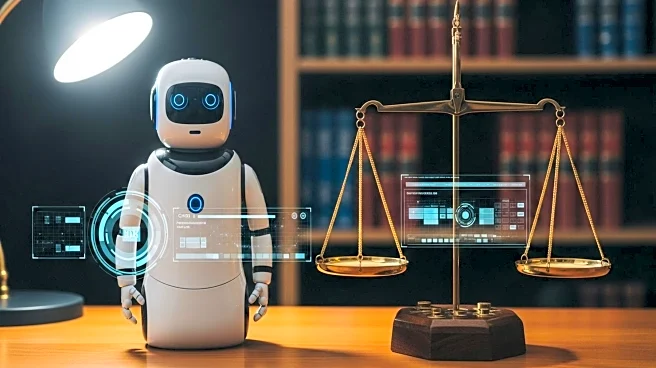What's Happening?
The legal industry is grappling with the integration of AI tools, particularly in the realm of communication and writing. A recent blog post highlighted the tension between traditional writing methods and AI-assisted drafting. The author shared an experience where an AI suggested removing the term 'hot mess' from a title, which was ultimately retained and led to increased engagement. This incident underscores the importance of maintaining personal style and judgment in writing, despite AI's influence. Historical examples, such as Hemingway's famous line in 'The Sun Also Rises' and Dr. Martin Luther King's 'I have a dream' speech, illustrate the significance of word choice in creating memorable and impactful communication.
Why It's Important?
The integration of AI in the legal industry presents both opportunities and challenges. While AI can assist in drafting and editing, it may not capture the nuance and creativity required for effective communication. This is crucial in the legal field, where persuasion and clarity are paramount. Overreliance on AI could lead to generic and less impactful writing, potentially affecting legal outcomes and client relationships. Lawyers must balance AI's efficiency with their own strategic judgment to ensure their communication remains compelling and memorable. The broader implication is a need for professionals to develop skills that complement AI, rather than relying solely on technology.
What's Next?
As AI continues to evolve, legal professionals may need to adapt their practices to incorporate AI tools effectively while preserving their unique communication styles. This could involve training on AI usage and developing guidelines for when to rely on AI versus personal judgment. The industry might also see increased collaboration between AI developers and legal experts to create tools that better understand legal nuances. Additionally, ongoing discussions about the ethical use of AI in law could shape future regulations and standards, ensuring that AI serves as a beneficial tool rather than a replacement for human expertise.
Beyond the Headlines
The ethical implications of AI in legal writing are significant. As AI tools become more prevalent, questions arise about authorship and accountability. If AI drafts a legal document, who is responsible for its content? This could lead to new legal standards and practices regarding AI-generated work. Furthermore, the cultural impact of AI on language and communication styles may influence how future generations perceive and use language, potentially altering traditional writing norms. The legal industry must navigate these changes carefully to maintain the integrity and effectiveness of legal communication.












